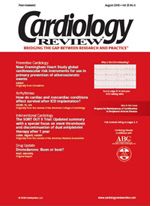Publication
Article
Is mortality a function of age in congestive heart failure?
In the current edition of Cardiology Review, Gustafsson and colleagues (page 37) present their data on a large cohort of patients in Denmark who were screened for a study on the effect of the antiarrhythmia drug dofetilide (Tikosyn) on mortality in congestive heart failure (CHF). The effect of the drug was found to be neutral and, therefore, patients enrolled in the study and those screened but not enrolled were surveyed for the present analysis of mortality as a function of age.
It is useful to note that these patients represent 5,548 consecutive patients hospitalized in Danish hospitals for new or worsening CHF between 1993 and 1996. So inclusive a population study, with its clear relevance to the population at large, would be difficult to carry out in the United States, or in any country with a fragmented health care system, in which the data are as fragmented as the care itself.
The authors divided their cohort into the following age groups: less than 61 years, 61 to 70 years, 71 to 80 years, and more than 80 years. Follow-up was for 5 to 8 years. They examined multiple variables, as one would expect, including left ventricular size and function; presence of ischemic heart disease; hypertension; diabetes; smoking; atrial fibrillation; renal function; and duration of CHF. Of note, presence of anemia, a current subject of interest, was not investigated.
Age was a significant predictor for both short-term (30 days) and long-term mortality. As one would expect, left ventricular function was significantly associated with long-term survival for any age group (Table).
Two questions naturally arise, particularly as one looks at the oldest age groups: How does survival in these CHF patients compare with survival in the general population? How long does one expect a 70-year-old, or an 80-year-old, to survive? Data from the Centers for Disease Control and Prevention (CDC) are of interest in this regard. Shown below the Table is the life expectancy for corresponding age groups in the general population, according to 2002 data from the CDC.
It is clear that, even in the oldest age group, CHF represents a considerable burden on life expectancy. This sort of data should reinforce the demand that age not be an excuse for withholding optimal care because there are potential good years of life to be gained from successful treatment of the elderly.
A number of other interesting findings emerge from the authors’ analysis. There were more women in the older age groups, their symptoms had been present for longer, and they had a much higher incidence of diastolic dysfunction. Not surprisingly, atrial fibrillation was more common in the older population. Interestingly, hypertension was not more prevalent in the older groups, and thus there is not, in these data, a good explanation for the higher incidence of diastolic dysfunction. This correlation of diastolic dysfunction with age is now well recognized, however, and may relate to other anatomic and physiologic changes in the myocardium.
What is the take-home message from this analysis? CHF has a major impact on life expectancy (with a startling 72% overall mortality during follow-up), and older patients have worse prognoses. Their prognosis is due to the CHF, however, and not to their age alone; therefore, we owe it to all such patients to offer optimal treatment (with due regard for their age).






